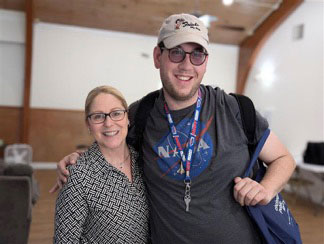By Melissa W. Hunter
Assistant Editor
On Thursday, September 7, the JCRC of Cincinnati hosted Amy Spitalnick, the Jewish Council for Public Affair’s (JCPA) new CEO, as their first scholar-in-residence for the Leaders in Light Institute. Spitalnick first rose to prominence as Director of Integrity First for America (IFA), the organization that brought the lawsuit against the white supremacists and neo-Nazis responsible for the violence in Charlottesville, Virginia in 2017. In her new role as CEO, Spitalnick will continue the legacy she began fighting extremism in all its forms.
Spitalnick sees her role as a culmination of not only her career up until now, but the work she pursued in college as well. “I was president of my Hillel at Tufts,” Spitalnick said. “At the time, I attended a conference in Washington where students could learn about advocacy and government and politics. That makes this role all the more meaningful to me.”
The JCPA is focused on issues that are at the crux of Jewish safety and the safety of so many other communities. Spitalnick sees her position as an opportunity to build coalitions in the fight against bigotry and extremism. “Fighting for democracy and establishing cross-community relationships means showing up for one another. This shouldn’t be a partisan issue. It should be at the core of what this country is all about. This also reflects the values and traditions of the Jewish community,” Spitalnick explained. “The challenge is, how do we take these issues and make sure people understand them not as partisan or ideological ideas, but as concepts that are fundamental to our safety and security in this country?” Spitalnick went on to say that a key step is to partner with both Jewish and non-Jewish organizations on a local and national level, to show that civil rights, democracy, and inclusion are not only crucial for everyone, but specifically the Jewish community, which has always been safest in a pluralistic democracy.
Through Spitalnick’s work with the JCPA, she will be involved in building two coalitions that will bring together partners as well as engage and empower JCRCs. This includes work that will focus on protecting civil rights, combating extremism and disinformation, taking on issues of education (including book banning) and fighting hate, discrimination, and extremism.
Spitalnick feels it is important to show up for other communities being targeted, including the trans, immigrant, Black, and Muslim communities. “Antisemitism is interconnected with other forms of hate because antisemitism is both a prejudice in and of itself, and uniquely operates as an overarching conspiracy theory that fuels other forms of hate.
“There is a gap in telling the story of why Jewish safety needs to go hand-in-hand with other communities’ safety.” Mobilizing the Jewish community to work with non-Jewish allies and partners benefits both parties. “The Leaders in Light program is a phenomenal example of how we bring diverse communities together to grapple with the really hard challenges around democracy and extremism that we are facing, and build unlikely partnerships to have these tough conversations.”
Spitalnick’s past work makes her the perfect candidate to take on this new role. As executive director of Integrity First for America, she led the legal charge against the organizers of 2017’s deadly neo-Nazi march in Charlottesville. She is also the granddaughter of Holocaust survivors. That has always been part of her identity, but in the last five to seven years, it has come into sharp focus in a way she never expected growing up.
“My grandparents’ stories were part of history. They didn’t feel like imminent threats,” Spitalnick said. “I felt lucky to live in America. I always felt it was safe here. I don’t remember any major instances of antisemitism growing up.”
She grew up in the era of the Oklahoma City bombings and 911, which were formative in shaping the national discussion on issues of security, and led to hate crimes against others. According to Spitalnick, “we are now seeing extremism and antisemitism and other forms of hate crimes so explicitly emboldened and normalized not just by fringe groups, but increasingly by politicians, pundits, and people who have mainstream platforms. This is unique to the last five to seven years.”
She is a deep believer in the power of local and state levels of governments and organizations to lead and to act. With the Muslim ban and DACA, she saw policies being enacted that were not just at odds with Jewish values, but fundamental civil rights and democratic values as well. “I felt most useful during those dark times doing the hard work, particularly after Charlotttesville, when it seemed like there was little to no accountability for what happened.”
This recent crisis requires a whole-of-society approach, and the implementation of the U.S. National Strategy to Counter Antisemitism by the White House is part of that approach. “The plan in general is historic on many levels, including that it fundamentally recognizes that at the core of Jewish safety is democracy, solidarity with other communities, and that our safety is only going to be advanced when we advance other communities’ safety.” Spitalnick was part of the first meeting held at the White House last December that led to the formulation of the plan. “It was incredibly meaningful to be there. It led to a plan that reflects the needs and the reality of this crisis, and now it’s our job to support implementation of that plan however possible.”
“What’s happening in and to the Jewish community in Cincinnati is indicative of what’s happening around the world,” Spitalnick went on to say. “Having more diverse voices at the table is crucial. The fundamental reason JCPA was formed 80 years ago is just as relevant, if not more so, today.” As CEO for the JCPA, Spitalnick is ready to take on this new chapter in her career and bridge the gaps between communities that is necessary to our democracy.





